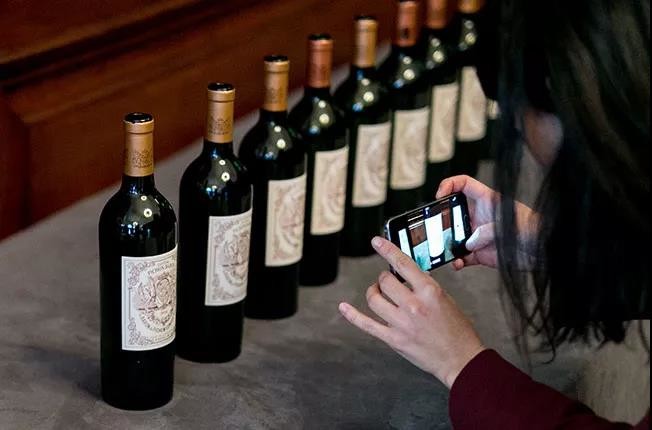I’ve never taken part in a true blind tasting. Have you? It would, I think, mean sitting in a cubicle in an anonymous research laboratory staffed by strangers. Wine samples would emerge through a hatch. We’d write a description of the wine, provide answers to a few questions, or score what we’d tasted according to a number of different parameters. Then go home. Hardly top fun, I know, but at least it would be objective.

Not according to my correspondent Ali Amidi, a neuroscientist from the University of Aarhus in Denmark. ‘I don’t believe,’ Ali told me, ‘there is anything like an objective wine tasting, only different subjective ones.’ He initially wrote to me about the best way to organize a blind tasting of 2004 Bordeaux second growths, though he confessed that he’d really rather taste them sighted. Because he knows that, looking at the labels, he’d enjoy the wines more. That, you see, is the way the human brain works.
‘I guess it all started,’ he told me, ‘with a number of disappointing wines that were entered in blind tastings with friends. Sometimes great bottles would get lambasted. However the second we saw the label of a well-known and respected château, our perceptions would slowly, if unwillingly, change for the better. When such wines were tasted with the label visible to us, they rarely disappointed.’
Ok: we’re probably all familiar with that. Why, though, would unknown wines served in a lab be subjective? ‘Brains,’ according to Ali, ‘have an amazing capacity to rapidly integrate information from many different sources, and human experience is probably always modulated by both conscious and unconscious information available to us in the surroundings and internally. Furthermore cognitive processes are continuous. They don’t have a beginning or an ending, and thus the experience of a wine (or anything else) is always emerging from “somewhere”. My point here is that the brain and human experience is never really neutral or unbiased. Experience is always modulated by information available to us, so when we change the surroundings or context, we are changing the experience.’
The clinical surroundings of the laboratory and its cubicle, in other words, might instantly jostle us into adopting a kind of assumed objectivity whose subjective dimension is hyper-criticality. That’s why (as experiments of this sort usually show) we end up by comprehensively muddling up expensive wines and cheap wines in ‘deep blind’ tastings, and finding them all fall short in one way or another. The headline – once the results are published – is then that ‘experts’ or ‘consumers’ can’t tell the difference between cheap wine and expensive wine. In fact, though, the experience is no different from going to a big Bordeaux tasting and scoring First Growths more highly than crus bourgeois. We are doing what our brains tell us to do in relation to our surroundings and the information they provide. It’s not the wine talking; it’s the everything talking.
If you want to derive pleasure from tasting wine, in other words, then you are best off knowing as much as possible about the wine in question, including its cultural history, its level of classification, and what those regarded as figures of authority in the field think of it. ‘That is why,’ says Ali, ‘I like to “drink labels”, or Parker points, or Decanter Trophies – because they get me excited and full of anticipation, for better or worse.’
Isn’t this a bit unfair, though, on wines from less-exalted areas or new growing regions or countries? How can they ever truly compete against those with the longest pedigrees, the best rank in a classification, the most kudos? Isn’t this just a recipe for a frozen wine world of unchanging hierarchies?
The role of the critic, or of the blind-tasting competition, is to elevate the meritorious regardless of pedigree. It actually doesn’t matter if true objectivity is a fantasy; simply changing the subjective filter is a worthwhile exercise.
Having just spent a week in Hong Kong judging the Decanter Asia Wine Awards, indeed, I feel confident that the ‘shallow blind’ way in which both that and the Decanter World Wine Awards – and rival competitions – are judged is a worthwhile approach. We know the context of the wine (appellation, vintage, varieties, alcohol, residual sugar and oaking) but not the producer’s identity. Gold medals, thus, emerge from within a peer group. It’s only the International Trophies which take the level of blindness a little deeper – in removing almost all of that information, and muddling peer groups. Does that make an International Trophy better than a gold medal? Not necessarily. It just means that a wine has performed well in a different context.
Quality in wine, to summarise all of this, does exist. The lesson of neuroscience is that for the human taster, quality cannot exist on its own, in isolation, but is always meshed into both a producing and a consuming context – so the ideal of objectivity is impossible. Changing your subjective filter will deliver new results and perspectives, but for wines with a long track record, sighted tasting is liable to provide the most profound pleasure of all.
All rights reserved by Future plc. No part of this publication may be reproduced, distributed or transmitted in any form or by any means without the prior written permission of Decanter.
Only Official Media Partners (see About us) of DecanterChina.com may republish part of the content from the site without prior permission under strict Terms & Conditions. Contact china@decanter.com to learn about how to become an Official Media Partner of DecanterChina.com.



Comments
Submit